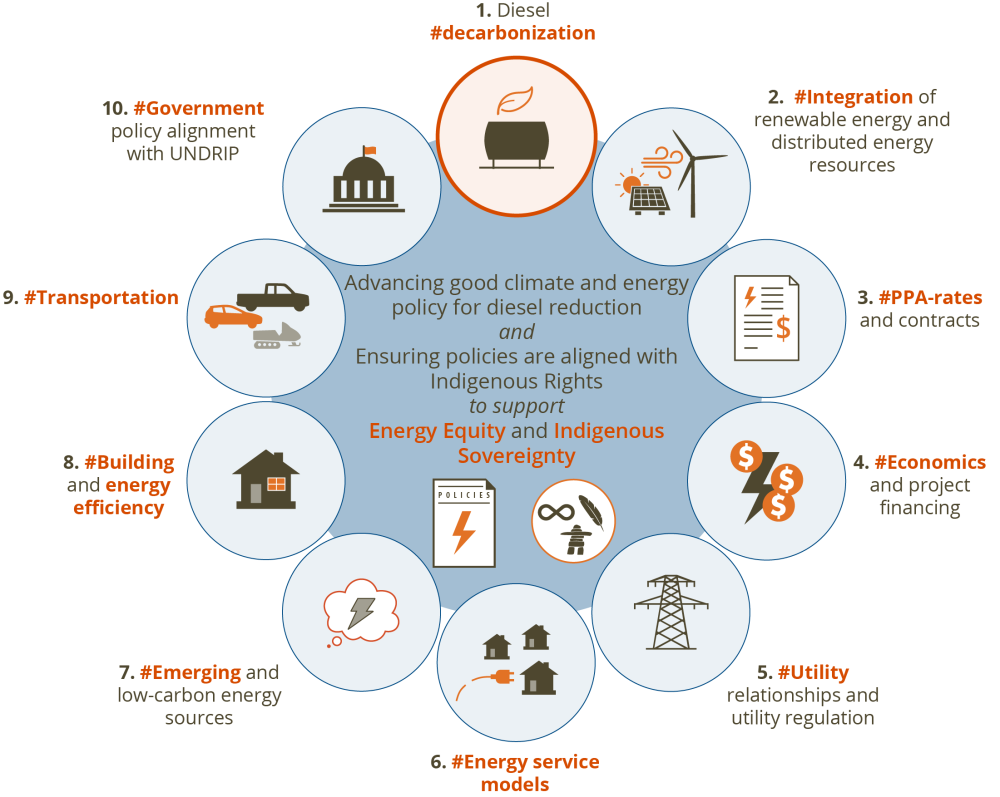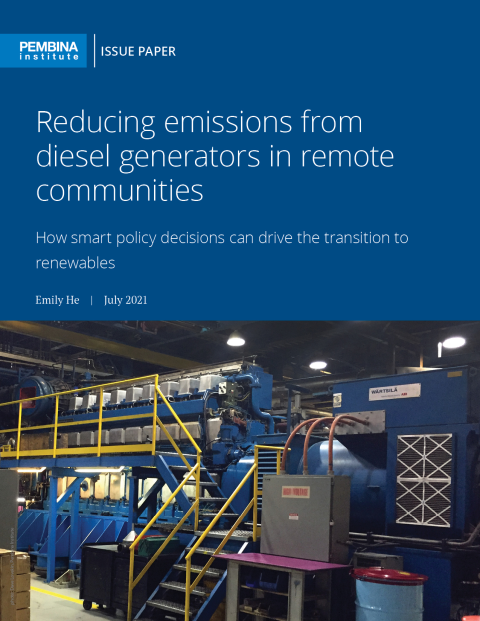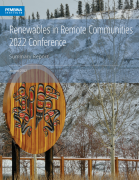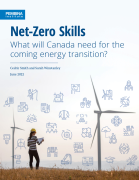This is the fifth publication in Climate and energy policy advancements: Eliminating diesel in Canada’s remote communities, a series providing insights, details, and analysis of each of the specific policies we advocate for under our Renewables in Remote Communities (RiRC) program and the Indigenous Off-diesel Initiative (IODI).
Diesel generators provide most of the electricity supplied to remote communities across Canada. According to the Pembina Institute’s Diesel Reduction Progress Report, as much as 79% of the electricity used in remote communities originates from diesel generation. Given the heavy dependence on diesel, a transition to clean energy won’t happen quickly. However, avenues for reducing emissions from existing generators can be pursued in conjunction with broader efforts to support the clean energy transition.
How we can lower carbon emissions from diesel generation
Replacing aging infrastructure and fuel switching
Options to partially decarbonize generators include replacing ageing generators with more efficient models. Moreover, new generators allow for renewable energy integration through hybrid power systems. Another option is enhancing existing diesel systems with efficiency improvement technologies. These include combined heat and power systems, where thermal energy generated during power production that would otherwise be wasted is recovered and used to heat buildings in the community. In addition, variable speed drives allow generators to run at varying and optimal speeds depending on the load, thereby increasing fuel efficiencies while reducing operations and maintenance requirements and extending a generator’s operational life.
Beyond upgrades in infrastructure, the carbon intensity of the diesel fuel itself can be reduced through fuel switching, where conventional petrol-diesel is replaced with fuels that are less carbon intensive and produce less greenhouse gas (GHG) emissions.
Progressive policy is needed to promote carbon reduction in diesel-based energy
Currently, there are no government policies in place to incentivize upgrading inefficient generators, installing high-efficiency technologies, or fuel switching. Rather, electricity generation from diesel in remote communities is exempt from many existing climate and energy policies designed to improve the environmental performance of energy systems (such as the Off-Road Compression-Ignition Engine Emission Regulations, Canada’s regulations on sulphur in diesel fuel, and carbon pricing).
These policy exemptions promote the continued use of inefficient, emission-intensive generators and make the transition to clean energy even more challenging. An exemption from carbon pricing, among other subsidies, favours the economics of diesel energy systems and fails to push the boundaries of the larger systemic change needed in remote communities.
Meeting Canada’s diesel reduction goals and incentivizing communities to develop renewable energy projects will require an approach that combines increased access to grants and policy levers, including a review of current exemptions. In the U.S., the EPA’s Diesel Emission Reduction Act (DERA) provides funding specifically for diesel projects that use pollutant reduction technologies. This is one option for funding projects that directly target diesel decarbonization. While Canada has established several funding programs to support renewable energy projects in remote communities (such as the federal Clean Energy for Rural and Remote Communities program, the B.C. Renewables for Remote Communities program, and the Canada Infrastructure Bank’s Indigenous Community Infrastructure Initiative program), these do not place a specific value on reducing the environmental impact of diesel infrastructure.
Ultimately, decarbonizing diesel energy systems presents opportunities to integrate renewable energy for remote communities, diminishing the environmental and health impacts of diesel reliance. Furthermore, for each province and territory to meet its national and regional greenhouse gas (GHG) reduction targets, all sectors need to contribute to solutions. Thus, diesel generation systems in remote areas must be subjected to more stringent regulations to mitigate harmful emissions as we fully transition to a clean and sustainable energy future.
The establishment of new policies and a re-evaluation of current exemptions, such that diesel fuel systems are decarbonized through generator upgrades and fuel switching, are key parts of the overall solution to achieving a more sustainable, resilient, and affordable energy system in remote communities.
Next up: A closer look into how utility business models and relationships influence clean energy projects in remote communities and Indigenous energy sovereignty.

Climate and energy policy advancements: Eliminating diesel in Canada’s remote communities
Publications in this series:
- Rethinking energy policy in Canada’s remote communities
- How to boost renewable energy integration in remote communities
- What’s a fair and equitable price for renewable energy in remote communities?
- Better government policies will unlock the cash remote Indigenous communities need for clean energy
- Reducing emissions from diesel generators in remote communities
- When business-as-usual is a barrier to clean energy
- From diesel dependency to energy empowerment
- Three clean energy options that could help replace diesel
- Remote communities transitioning to clean energy need better housing
- How remote communities should be included in the push to electrify transportation
- Government action on UNDRIP and the clean energy transition






